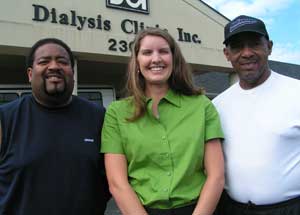Editorial
Front Page - Friday, August 28, 2009
Kidney Foundation helps sufferers deal with disease
David Laprad

Being diagnosed with chronic kidney disease can feel like the end of the world. The Kidney Foundation of the Greater Chattanooga Area, however, works to help sufferers make the transition to a new way of life and minimize the emotional and financial impact of end-stage renal failure.
“We want to show people it’s not the end of the world,” Jennifer McGlohon, executive director of the foundation, says of the disease.
According to the National Institutes of Health, an estimated 27 million Americans suffer from kidney disease. In addition, the country has seen a 30 percent rise in renal
failures in the last decade.
Because of the time-consuming nature of dialysis — the only treatment option other than a transplant — many sufferers lose their job because they can’t work full-time. Those that manage to hold down a part-time job between treatments, which generally take place three times a week and can last several hours, still face a ruinous drop in income.
“They become dependent on social services,” says McGlohon. “We’ve had cases where the breadwinner in the family had to choose between the medication that was keeping him alive and feeding his kids.”
A major dietary change also takes place, and is one of the most difficult transformations sufferers undergo. “Being a Southerner on dialysis is really hard. You can kiss potatoes, chocolates, a lot of the melons and pretty much anything else that’s a staple of the Southern diet goodbye,” McGlohon says. “So we want to step in and give them a leg up so they
can enjoy life again.”
While it might help a shell-shocked patient to hear that life can still be good, the foundation puts its money where its mouth is by providing a number of services that help ease the burden.
As part of its financial assistance program, the foundation helps with rent and mortgage payments as well as utility bills. The group will also pay for a patient to be transported to and from dialysis and make sure he has food on his table and the medicine he needs.
“There are some things for which we don’t pay, such as hospital bills and dialysis, but a lot of our patients receive help from the government for those things, so we fill in the blanks and get them back on their feet,” says McGlohon.
The foundation also hosts support groups and caregiver councils, allowing new patients to talk with people who have lived with renal failure for as long as 30 years and family members to share their experiences with an empathetic audience.
In addition, the foundation has dieticians on hand that help patients create a customized meal plan. “A lot of our patients have pre-existing conditions like high blood pressure and diabetes, so the dietician is a key component in putting the pieces together,” McGlohon says.
The good news, beyond the help the foundation provides, is that a person can minimize the chances of his kidneys failing by keeping the risk factors in check.
“We have a new education campaign coming out in which a gentlemen says he would’ve taken his blood pressure medicine if he’d known not taking it would caused his kidneys to fail,” says McGlohon.
Since preventing kidney disease is easier than treating it, education is a key component of the foundation’s efforts. The group also encourages everyone to have a doctor check their kidneys periodically since early diagnosis can help a sufferer avoid the more extreme treatments.
“Go to a doctor if you’re experiencing fatigue and swelling of the eyes, wrists and ankles,” McGlohon says. “And when you’re at your
doctor for your annual physical, ask him to screen your kidneys. You might have to shell out a couple of extra bucks, but it’ll be worth it because if you catch any disease early on, you can maintain it on medication for the rest of your life.”
The foundation does rely on donations to fund its activities. The group is independent of the National Kidney Foundation, though, so all of the money it receives goes to helping people in its service area, which includes 18 counties in Tennessee, Georgia and Alabama.
The foundation’s next fundraiser is the Second Annual Dare to Dance, scheduled to take place at the Alhambra Shrine Building on September 12. Visit www.kidneyfoundation.com or call 423-265-4398 for complete details.
“We’re going to showcase some of our at-risk youth, who have been taking ballroom dancing lessons and will be doing an exhibition,” McGlohon says.
Ticket holders will be helping the foundation in its efforts to
minimize the devastating effects of a life-altering disease.
“If you were head-over-heels in love with your life before, it’s going to be a hard adjustment,” says McGlohon. “But at the same time, if you’ve been suffering from undiagnosed kidney disease, you’ll actually start living a better life.”
|
|